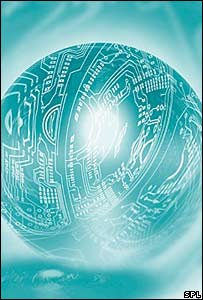 Silicon electronics are a staple of the computing industry, but researchers are now exploring other techniques to deliver powerful computers.
Silicon electronics are a staple of the computing industry, but researchers are now exploring other techniques to deliver powerful computers.
In a quantum computer data is not processed by electrons passing through transistors, as is the case in today' + char(39)+ N' + char(39)+ N' + char(39)+ N's computers, but by caged atoms known as quantum bits or Qubits.
"It is a new paradigm for computation," said Professor Artur Ekert of the
A bit is a simple unit of information that is represented by a "1" or a "0" in a conventional electronic computer.
A qubit can also represent a "1" or a "0" but crucially can be both at the same time - known as a superposition.
This allows a quantum computer to work through many problems and arrive at their solutions simultaneously.
"It is like massively parallel processing but in one piece of hardware," said Professor Ekert.
Complex systems
This has significant advantages, particularly for solving problems with a large amount of data or variables.
"With quantum computing you are able to attack some problems on the time scales of seconds, which might take an almost infinite amount of time with classical computers," Professor David Awschalom of the
In February 2007, the Canadian company D-Wave systems claimed to have demonstrated a working quantum computer.
At the time, Herb Martin, chief executive officer of the company said that the display represented a "substantial step forward in solving commercial and scientific problems which, until now, were considered intractable."
But many in the quantum computing world have remained sceptical, primarily because the company released very little information about the machine.
The display also failed to impress.
"It was not quite what we understand as quantum computing," said Professor Ekert. "The demonstrations they showed could have been solved by conventional computers."
However, Professor Ekert believes that quantum computing will eventually come of age.
Then, he said, they will not be used in run-of-the-mill desktop applications but specialist uses such as searching vast databases, creating uncrackable ciphers or simulating the atomic structures of substances.

 Previous page
Previous page Back to top
Back to top







